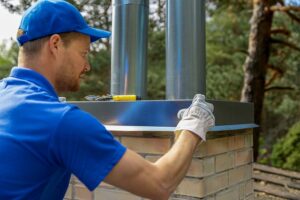
Your chimney may seem sturdy and reliable, but water damage can throw a wrench in things.
Homes are outfitted from top to bottom with waterproofing measures. Basements are waterproofed, gutter systems channel water away from the foundation, windows are protected with awnings, and walls and floors are sealed to prevent water damage. But what about your chimney? A chimney is just one long opening that exposes your home from the roof to your living space. And while it may seem sturdy and reliable, water damage can throw a wrench in things. Here is what you need to know about water damage and your chimney.
How Water Enters Your Chimney
During heavy rain and snow, it’s easy to see how water can fall into an unprotected chimney, but that’s not the only cause of water damage. Bricks are highly porous, meaning they absorb water. Since your chimney is exposed to the elements, they’re at risk of water damage.
When water gets into the mortar joints and freezes in winter, it expands, creating cracks that let more water in. Eventually, these cracks grow larger through continuous freezing and thawing cycles. If this cycle continues for too long, it could lead to spalling bricks, loose mortar joints, and more significant water leaks.
How Water Damages Your Chimney
Water leaks aren’t the only problem you have to worry about regarding excess moisture, such as:
- Spalling: Water damage can lead to spalling, which is when the surface of the bricks breaks off. Spalling weakens your chimney’s structural integrity. You can identify this problem by looking for small pieces of broken brick around the base of the chimney.
- Corrosion: When water seeps into the chimney, it causes metal components like your firebox or flue liner to rust.
- Mortar Deterioration: Repeated exposure to moisture also causes the mortar joints to loosen and deteriorate, weakening the overall structure. If this goes unchecked, you could end up with a chimney collapse on your hands.
How to Avoid Water Damage
Water damage can be avoided by doing basic maintenance and inspection on your chimney. Many inspections can be done while you inspect your roof for damage. Remember, the quicker you catch an issue, the easier it will be to fix. Look for issues like cracked or broken flashing, a missing chimney cap, or general damage.
You must contact a professional chimney sweep immediately if you see any of these issues. They’ll come out to check if water has got into your chimney and repair your issues. Regular inspections will protect your chimney from the elements.
Schedule Your Chimney Cleaning from Champion Chimneys, Inc.
When you need a trusted company for your chimney inspection and chimney cleaning, you can trust our team. Champion Chimneys, Inc. is a fully licensed, bonded, and insured chimney service company that has served customers in Baltimore County, Howard County, and Anne Arundel County, Maryland, since 2001. Our team is trained and certified by Certified Chimney Professionals, Inc. (CCP, Inc.). We specialize in all aspects of your chimney system. Whether you need chimney and flue cleaning service or a full chimney rebuild or inspection, contact us at 443-Chimney today and let us fix all your chimney problems. Also, follow us on Facebook, Twitter, LinkedIn, and Pinterest.
